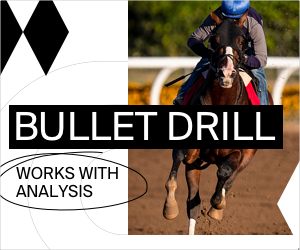Maximum Security–starting as the 9/2 second choice to favored Improbable at 4-1–had the lead turning into the stretch of the 145th running of our nation’s most important horse race. He then drifted out suddenly into the path of…
What am I doing? You don’t need a blow-by-blow rehashing of the event. Unless you’ve been training with ISIS for the past week you saw what happened, probably again and again. It appeared on all the major news and sports networks, repeatedly. Maximum Security’s owner Gary West also was on the Today Show. Even if you’re a devout cord-cutter, there’s still no way to have avoided online replays of the incident. Hi-def video at full, half, and three-quarter speed, still shots, pan and head-on views. There even are Abraham Zapruder-like frames highlighting a mysterious glare and culpable cameramen stationed surreptitiously along the inside rail.
After the incident, at least one and probably two jockeys claimed ‘foul.’ We’re not entirely sure about that because the stewards have been about as communicative to the public about this as Bill Barr has been to congress on the Mueller Report. Three stewards charged with officiating proceedings observed the race through binoculars and via an assortment of television monitors and angles. They either missed the incident entirely live or wished to ignore it because they never announced that they were conducting an ‘Inquiry’—a formal investigation into the race. Had one or two jockeys not lodged appeals it’s reasonable to assume Maximum Security would be the 145th Kentucky Derby winner instead of Country House. (Full disclosure, yours truly also would be $5,400 richer from a successful Pick 5 investment.)
Often the best policy for horseplayers who suffer slings and arrows of bad beats and disqualifications is to ‘turn the page’ to the next race. Fuhgeddaboudit. It all evens out in the end. Racing gods giveth and they taketh away. Lately, though, they’ve been a bit delinquent in the ‘giveth’ part.
In the aftermath of the first on-track ‘win’ disqualification in the 145-year history of the Kentucky Derby, ‘turn the page’ just isn’t enough. Not yet. This unique moment demands more examination than a mere passing glance. This ain’t a mere ‘once-in-a-lifetime’ occurrence. It’s more like a ‘once-in-3-lifetimes’ deal. Do you know what happened just five days before the initial running of the Kentucky Derby in 1875? The first shutout in pro baseball—Chicago 1, St Louis 0!
After the Derby, I rushed to join former high school classmates to celebrate our 45th reunion. Besides noticing how old these guys looked, I was struck by how many of them were interested in what had transpired in Louisville. Since I was the only racing ‘expert’ in the group, I was asked to explain.
I figured a sports analogy would work best. Here’s what I told them:
Imagine Tom Brady throws a walk-off, Super Bowl-winning TD pass. Following the play, a defensive lineman, who was far from sacking Brady, complains to an official that he was held. Simultaneously, another defensive lineman, located even further from Brady, claims he was dangerously chop-blocked. Despite vehement protests that they were fouled, both players readily admitted that no defensive player was going to get within yelling distance of Brady.
Of course, NFL fans know that under current rules those particular foul claims are not subject to review. Therefore, the play stands! New England wins the Super Bowl…again.
However, what if those infractions were reviewable like they are in racing? And, what if, based on enhance coverage and extensive video analysis, they were proved valid? Would the referee then remove a yellow flag from his pocket, ceremoniously drop it and wipe out Tom Terrific’s Super Bowl-winning touchdown pass? Would zebras summon players back from the locker room? Herd photographers and other media back behind the sidelines? Command that celebratory confetti be stuffed back into the rafters? Interrupt another Brady ‘I’m Going to Disneyland’ moment?
Probably not. But under the letter of the law the referee has every right to call a penalty on the play…two, in fact…and wipe out the result. I learned a long time ago that just because you can do something doesn’t mean you should. Racing officials have wide latitude and discretion in enforcement and punishment. Fouls that have little or no effect on the outcome can be disciplined in other ways—fines and supspensions.
You may believe that ‘a foul is a foul is a foul’. However, that’s not how racing stewards are supposed to adjudicate. By statute they can consider if the incident affected the outcome of the race, if so and how much and what to do about it.
For example, how would you feel if you were pulled over and ticketed for doing 55 in a 50 mile-per-hour zone? Thought so. But you broke the law…didn’t you? Exceeded the speed limit by 5 miles per-hour! A foul is a foul, right?
Smell what I’m cooking here? Jockey Luis Saez and Maximum Security committed a foul in the 145th Kentucky Derby. No argument there. They drifted out and interfered with at least two other foes. However, in my humble opinion, the incident did not affect the eventual order of finish. The best horse crossed the finish first in the Kentucky Derby. How do I know? I don’t, really. But I do know that I’m uncomfortable when a sentence proves way more severe than the corresponding crime. This is not a cut and dried decision. Many intelligent, experienced racing folks feel justice was done. And, you know what? I can’t say they’re wrong. To my way of thinking, though, if an official is going to erase a Super Bowl-winning play or a Kentucky Derby victory, then the offense ought to be just short of armed robbery.
But that’s just me. I could be wrong.
Race On!

